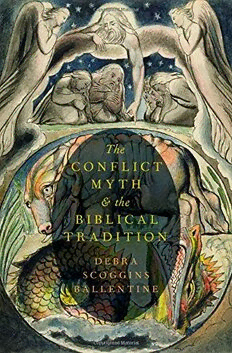
The Conflict Myth and the Biblical Tradition PDF
Preview The Conflict Myth and the Biblical Tradition
The Conflict Myth and the Biblical Tradition The Conflict Myth and the Biblical Tradition z DEBRA SCOGGINS BALLENTINE 1 1 Oxford University Press is a department of the University of Oxford. It furthers the University’s objective of excellence in research, scholarship, and education by publishing worldwide. Oxford New York Auckland Cape Town Dar es Salaam Hong Kong Karachi Kuala Lumpur Madrid Melbourne Mexico City Nairobi New Delhi Shanghai Taipei Toronto With offices in Argentina Austria Brazil Chile Czech Republic France Greece Guatemala Hungary Italy Japan Poland Portugal Singapore South Korea Switzerland Thailand Turkey Ukraine Vietnam Oxford is a registered trademark of Oxford University Press in the UK and certain other countries. Published in the United States of America by Oxford University Press 198 Madison Avenue, New York, NY 10016 © Oxford University Press 2015 All rights reserved. No part of this publication may be reproduced, stored in a retrieval system, or transmitted, in any form or by any means, without the prior permission in writing of Oxford University Press, or as expressly permitted by law, by license, or under terms agreed with the appropriate reproduction rights organization. Inquiries concerning reproduction outside the scope of the above should be sent to the Rights Department, Oxford University Press, at the address above. You must not circulate this work in any other form and you must impose this same condition on any acquirer. Library of Congress Cataloging-in-Publication Data Ballentine, Debra Scoggins. The conflict myth and the biblical tradition / Debra Scoggins Ballentine. pages cm Includes bibliographical references and index. ISBN 978–0–19–937025–2 (hardback : alk. paper) 1. War—Mythology. 2. Combat in the Bible. 3. Eschatology, Ancient. 4. Middle East—Religion. I. Title. BL325.W32B35 2015 201ʹ.309394—dc23 2014036626 1 3 5 7 9 8 6 4 2 Printed in the United States of America on acid-free paper With love, for Dan and Doris Scoggins Contents Acknowledgments ix I. Theorizing Myth in Ancient West Asian Studies 1 Myth Theory 2 Biblical Scholarship and the Category of Myth 8 Terminology 14 The Ancient West Asian Milieu and the Comparative Enterprise 16 II. The Conflict Topos in Extant Narratives 22 Anzu 23 Enuma Elish 30 Aššur Version of Enuma Elish 39 Baʿlu Cycle 48 Comparisons and Narrative Taxonomy 63 Conclusion 70 III. The Conflict Motif 73 Victorious Warrior Deities: ʿAnatu, Baʿlu, and Yahweh 76 Yahweh’s Combat Against the Sea/Dragon and Its Relevance for Humans 90 Divine Combat within Historiography: Combined Conflict and Exodus Motifs 92 Yahweh versus Human Enemies: Combat with Contemporary “Dragons” 98 The Temple 109 The Conflict Motif and Royal Figures 111 Conclusion 123 viii Contents IV. Continued Adaptation: The Conflict Motif and the Eschaton 127 Hebrew Bible Eschatological Battles 129 Revelation 137 Jesus/Christos as the Divine Warrior 143 Leviathan and Behemoth in the Eschaton and More Eschatological Battles 150 The “Holy One” versus the Prince of the Sea 166 Conclusion 170 V. The Motif of Yahweh’s Authority over the Sea and the Legitimacy of Individuals: Claiming versus Having Power over the Sea 173 Jesus 174 Antiochus IV Epiphanes 180 Gamaliel 183 Conclusion 185 VI. Conclusion 186 Leave “Chaos” Out of It 186 The Conflict Topos: Distinctions and Comparisons 189 Notes 199 Bibliography 255 Index 283 Acknowledgments many dear people have supported me on the way to submitting this study as my first book, from the first time I heard the stories of Enuma Elish and the Baʿlu Cycle my freshman year at the University of Georgia, through my graduate studies at Brown University, and now each semes- ter as I have the joy of introducing my students to these traditions. My family, friends, colleagues, and mentors have contributed positively to the process and content, while any inaccuracies and ill-formed thoughts are solely my own. In this study, as well as all spheres of life, I take great inter- est in how humans categorize phenomena. Our categories communicate a great deal, exhibiting how we value things, places, people, ideas, etc. With this in mind, I would like to blur the categorizations of the many individuals I wish to thank, as I have been nurtured by every colleague and mentor, and I have learned from every friend and family member. Thank you to Annie Mae Scoggins, Cooper and Emery Ballentine, Rosemary and Lilith Johnson, Brian Ballentine, Dana and Paul Sibley, Beth Dunlap, Jane Scoggins, Saul Olyan, Alice Slotsky, Ross Kraemer, Stan Stowers, Michael Satlow, Matthew Rutz, Ted Lewis, David Williams, Thomas Slater, Jordan Rosenblum, Dan Ullucci, Steve Larson, Kevin McGinnis, Emma Wasserman, Nat Levtow, Jennifer Singletary, Alissa MacMillan, Paul Robertson, Heidi Wendt, Aaron Glaim, Erin Roberts, Jennifer Eyl, Dan and Doris Scoggins. Finally, I would like to thank the many other scholars whose writings and presentations have stimulated my thoughts. It is a delight and honor to have the opportunity to participate with you in aca- demic study of the Hebrew Bible within its ancient West Asian cultural milieu.
